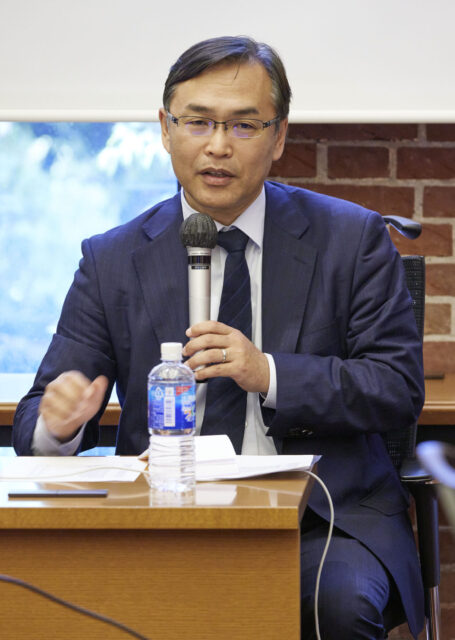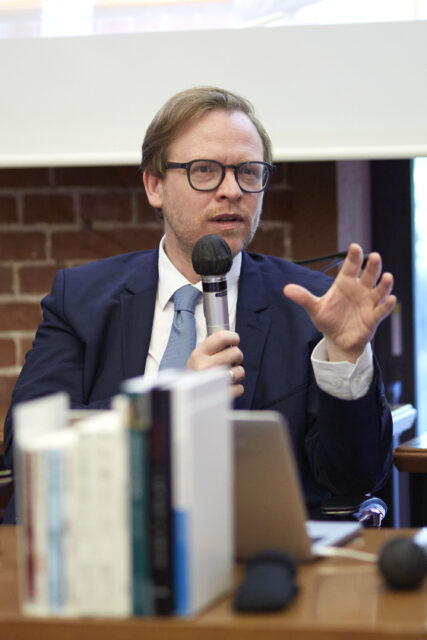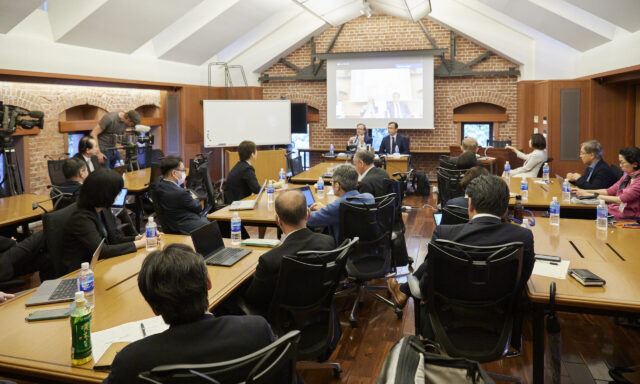On May 8th, 2023, (Monday) the second session of lectures for creating “A New Collaborative Research Organization for a New Enlightenment” was held at the Ito International Research Center. Titled “For a New Enlightenment,” Prof. Markus Gabriel (University of Bonn) gave a lecture. The lecture was focused on the background, philosophy, and modern activities of the “New Enlightenment” Project based at The New Institute, located in Hamburg, Germany.

 With people in the present day directly facing disturbances such as environmental problems without any previous examples, a “New Enlightenment” exceeding the dialectic of the Eurocentric Enlightenment is being requested. The creation of the New Institute is one of these attempts to create a New Enlightenment. At the institute, interdisciplinary cooperation is spread across fields such as academics, politics, business, technology, and art with the overall centric themes of 1) the requirements of humans in the 21st century, 2) social and economic change, and 3) the future of democracy. Additionally, there is also a system prepared for researchers across the world to live together while progressing their research at a 19th-century townhouse called the Warburg Ensemble. As part of another project, Prof. Markus Gabriel introduced the Center for Science and Thought (CST.) CST is a platform created to deal with the dangerous situations of today whilst creating connections between philosophy and natural sciences. At CST, researchers, while also bringing focus to digital technology and Artificial Intelligence, together with philosophy face the limit of scientific knowledge to strive for a better co-creation.
With people in the present day directly facing disturbances such as environmental problems without any previous examples, a “New Enlightenment” exceeding the dialectic of the Eurocentric Enlightenment is being requested. The creation of the New Institute is one of these attempts to create a New Enlightenment. At the institute, interdisciplinary cooperation is spread across fields such as academics, politics, business, technology, and art with the overall centric themes of 1) the requirements of humans in the 21st century, 2) social and economic change, and 3) the future of democracy. Additionally, there is also a system prepared for researchers across the world to live together while progressing their research at a 19th-century townhouse called the Warburg Ensemble. As part of another project, Prof. Markus Gabriel introduced the Center for Science and Thought (CST.) CST is a platform created to deal with the dangerous situations of today whilst creating connections between philosophy and natural sciences. At CST, researchers, while also bringing focus to digital technology and Artificial Intelligence, together with philosophy face the limit of scientific knowledge to strive for a better co-creation.
In the discussion, many questions varying in different fields were asked by participants. With the priority to give one’s best to work on an immediate problem daily in one’s field, would it be possible to “fuse” with other fields over time? While Europe and America have given birth to a spectacular thought, with the two countries’ problems concerning race or discrimination becoming more apparent than before, how would the “New Enlightenment” contribute to a realistic solution? With the New Institute itself being an organization built on significant capital, would it be possible for them to change the limit of capitalism and the dangers that come along with it?
To these various questions, Prof. Markus Gabriel responded to them based on the fact that because it is, in fact, an urgent situation, there is a need for numerous fields of scientific knowledge to see what truly is the “real problem,” including other perspectives such as the given awareness as practitioners, what would be their philosophy, or the changes in systems including the use of capital in his responses. Through the sharing of these worries and knowledge, discussions such as these serve as a chemical reaction to give courage to people across numerous fields and around the world for a “New Enlightenment.”

Reporter: Muyun Wang (EAA Project Research Fellow)
Photographer: Masatsugu Nokubo (Institute for Advanced Studies on Asia)
Translated by Atsuko Ishida








